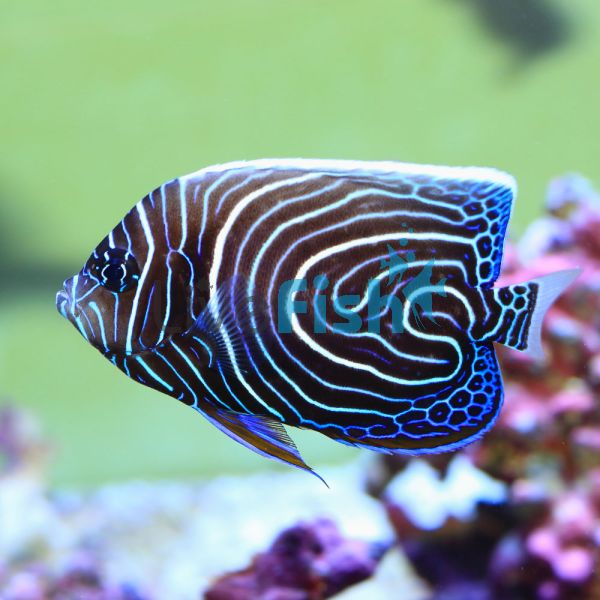Blue Girdled Angelfish - Medium Adult
The Blue Girdled Angelfish is an exceptionally attractive species of Angel Fish. It has a shy temperament and is more peaceful than other Angels.
Medium sized fish with Adult colouration
Adult Blue Girdled Angelfish
The Adult Blue Girdled Angelfish have a yellow “girdle”, permeated with blue spots, which runs down the middle of their body from the dorsal fin. The tail and dorsal fins, as well as the lower face are yellow, with the rest of the body keeping its blue colour. Juvenile Blue Girdled Angelfish have a blue body with vertical white stripes.
Breeding is instigated by the male, who will quickly swim around the female, then move above her. This encourages the female to swim towards the male, who gets her to lay her eggs by rubbing his nose on her stomach. After the females spawn the male will release his sperm for fertilization.
These fish are protandric hermaphrodites, meaning they all start adulthood as females before later transitioning to males.
Blue Girdled Angelfish are shy and will need plenty of hiding places, especially when first introduced into a tank. This can make it a challenge to get them to feed, so acquiring a younger specimen is often beneficial as they adapt better than mature adults.
Blue Girdled Angelfish originate from the Indo-Pacific region.
An adult Blue Girdled Angelfish can grow to 1 foot in length (30.5 centimeters) and can have a life expectancy of over 21 years.
This species requires moderate care and is recommended for more experienced aquarists. This is due to the need for high-quality water, specific reef lighting, and a large tank with many caves for the fish to shelter in.
A Blue Girdled Angelfish will make a beautiful addition to your aquarium, but they do need more attention than some other fish breeds.
Tank Recommendations for the Blue Girdled Angelfish
The recommended tank size is at least 180 gallons (681 litres).
In the wild, Blue Girdled Angelfish can live around reefs and coastal caves. They may be in pairs but more often they are solitary. Juveniles are usually found around inshore caves where there is plenty of algae, while adults tend to populate reefs with and lagoons where there is plenty of coral and a cave nearby.
Caution is advised when housing them in a reef environment as this species will nibble at LPS corals, and clam mantles. A Fish Only With Live Rock (FOWLR) tank with plenty of open space for swimming and caves for shelter may be more suitable.
Tank water needs to be of the highest quality when housing Blue Girdled Angelfish. In a FOWLR tank perform water changes of 30% per month or 15% per fortnight. In a tank with corals, 20% per month or 10% per fortnight is recommended.
Suitable Tank Buddies
Issues can arise if housed with other Angels or placed in a reef environment with LPS corals or Sea Fans.
This is a semi-aggressive species, and while it is shy when introduced, it can show aggression once it feels established in the tank. This aggression is usually directed towards similar-sized fish introduced after it and other Angels.
Unlike some other Angelfish, the Blue Girdled species do not have issues with most other fish and will not bully smaller fish.
Usually Compatible
You can keep Blue Girdled Angelfish with the opposite sex of their own species. It is safe with peaceful fish such as Dartfish, Gobies, and Fairy Wrasses, and can co-habit with semi-aggressive fish such as Clownfish, Dwarf Angels, and Anthias. Larger aggressive fish which are suitable include Groupers and Lionfish.
Sometime Compatible
Caution is advised with semi-aggressive and aggressive fish such as Damsels, Tangs, Wrasse, Dottybacks, and other large Angels
Rarely Compatible
Avoid housing with Seahorse/Pipefish as they are too delicate to be around Angels when they feed.
LPS Corals, Sea Fans, and Sponges are also best avoided.
Feeding Your Blue Girdled Angelfish
Blue Girdled Angelfish are omnivores. They need a varied diet of fresh and frozen food combined with prepared food. Popular vegetables which are suitable include marine algae, spinach, and spirulina. They will also eat meaty foods such as mysis shrimp, chopped squid. Food containing colour enhancement properties can be used as well as prepared food containing sponges. It is best to feed them at least 3 times per day.
| Scientific Name | Pomacanthus Navarchus |
|---|---|
| Care Level | Moderate |
| Common Names | Blue Girdled Angelfish, Majestic Angelfish or Navarchus Angelfish |
| Diet | Omnivore |
| Fish Family | Pomacanthidae |
| Lifespan (years) | 21 |
| Max. Length (cm) | 30.5 |
| Min. Tank Volume (l) | 681 |
| Origin | Indo-Pacific region |
| Reef Safe | With Caution |
| Sociability | Semi-aggressive |
| Venomous | No |
| Water Conditions | 22-25° C, dKH 8-12, pH 8.1-8.4, sg 1.020-1.025 |




